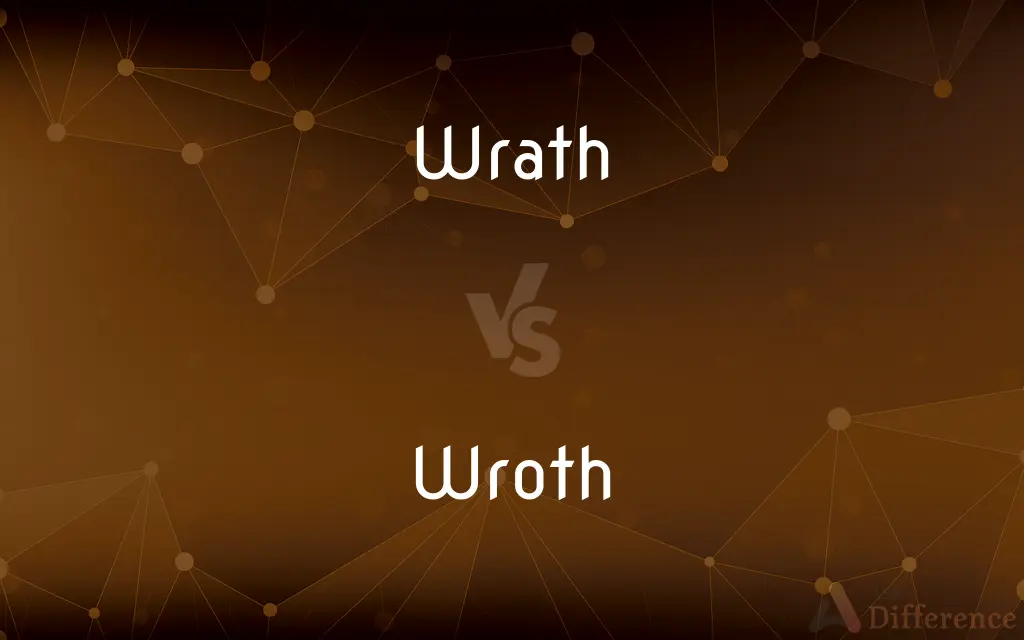Wrath vs. Wroth — What's the Difference?
By Tayyaba Rehman — Updated on September 24, 2023
Wrath is intense anger; Wroth is an archaic adjective meaning extremely angry.

Difference Between Wrath and Wroth
Table of Contents
ADVERTISEMENT
Key Differences
Wrath primarily refers to intense or fierce anger and is typically used to describe a violent or uncontrolled emotional state. It can signify a passionate or vehement reaction, often associated with revenge or punishment. Wrath is often depicted in literature and religious texts as a forceful and destructive emotion, capable of leading individuals to act in harmful or detrimental ways.
In contrast, Wroth is an adjective, and it's a somewhat archaic or literary term used to describe someone who is extremely angry. It is not commonly used in everyday conversation today but can be found in classical literature and poetry. Wroth describes a state of being, indicating that a person is filled with anger, usually as a result of being wronged or provoked.
Wrath is a noun, signifying a concept or an emotion, and it carries connotations of rage, fury, and often vengeance. It is seen as a powerful and overwhelming emotion that can dominate one's thoughts and actions, potentially leading to violent or aggressive behavior. It’s often portrayed in a manner that implies a loss of control, where reason is overshadowed by emotion.
Wroth, being an adjective, is used to characterize or describe a subject, usually a person, indicating their emotional state. When someone is described as wroth, it conveys a sense of deep anger or indignation, typically arising from a sense of having been wronged or slighted. It is more about the condition or state of a person’s feelings at a specific moment.
While both words relate to anger, the usage and implications of Wrath and Wroth are distinct, with Wrath portraying a more general and intense emotion, and Wroth specifically describing a person's angry condition, often used in a more literary or archaic context.
ADVERTISEMENT
Comparison Chart
Part of Speech
Noun
Adjective
Definition
Intense or violent anger.
Extremely angry, often in an archaic sense
Usage
More common, broad contexts.
Less common, primarily literary contexts.
Connotation
Strong, often destructive emotion.
State of being intensely angry.
Grammatical Role
Subject or object in a sentence.
Describes a noun, usually a person.
Compare with Definitions
Wrath
Fierce or destructive rage.
He incurred the wrath of his superiors for his insubordination.
Wroth
Extremely angry, often used in a literary or archaic context.
The king was wroth at the betrayal of his subject.
Wrath
Intense, violent anger.
His wrath was unleashed when he discovered the betrayal.
Wroth
In a state of offense or irritation.
The lord was wroth with his servant for his negligence.
Wrath
Strong vengeful anger or indignation.
She faced the wrath of the entire community after her controversial statement.
Wroth
Intensely incensed or infuriated.
She was wroth with her rival for spreading false rumors.
Wrath
A manifestation of anger.
His sudden wrath startled those around him.
Wroth
Exhibiting great displeasure or anger.
He became wroth when he learned of the injustice done to him.
Wrath
Extreme anger
He hid his pipe for fear of incurring his father's wrath
Wroth
Wroth is a surname, and may refer to:
Wrath
Forceful, often vindictive anger.
Wroth
Wrathful; angry.
Wrath
Punishment or vengeance as a manifestation of anger.
Wroth
Full of anger; wrathful.
Wrath
Wrathful.
Wroth
Full of wrath; angry; incensed; much exasperated; wrathful.
Revel and truth as in a low degree,They be full wroth [i. e., at enmity] all day.
Cain was very wroth, and his countenance fell.
Wrath
Great anger.
Homer relates an episode in the Trojan War that reveals the tragic consequences of the wrath of Achilles.
Wroth
Vehemently incensed and condemnatory;
They trembled before the wrathful queen
But wroth as he was, a short struggle ended in reconciliation
Wrath
(rare) Punishment.
Wrath
Wrathful; wroth; very angry.
Wrath
(obsolete) To anger; to enrage.
Wrath
Violent anger; vehement exasperation; indignation; rage; fury; ire.
Wrath is a fire, and jealousy a weed.
When the wrath of king Ahasuerus was appeased.
Now smoking and frothingIts tumult and wrath in.
Wrath
The effects of anger or indignation; the just punishment of an offense or a crime.
Wrath
See Wroth.
Wrath
To anger; to enrage; - also used impersonally.
If him wratheth, be ywar and his way shun.
Wrath
Intense anger (usually on an epic scale)
Wrath
Belligerence aroused by a real or supposed wrong (personified as one of the deadly sins)
Wrath
Punishment that is the consequence of anger, especially divine chastisement.
Many feared the wrath of the gods would bring ruin to the village.
Common Curiosities
Can Wrath refer to divine punishment?
Yes, Wrath is often used to describe divine anger and its consequences.
Is Wroth a common term in everyday English today?
No, Wroth is considered somewhat archaic and is primarily found in literary contexts.
Can the term Wrath be used metaphorically?
Yes, Wrath can be used metaphorically to describe intense displeasure or conflict.
Is Wrath always associated with violence?
While wrath often implies a violent anger, it does not always lead to violent actions.
Can Wroth be used as a noun?
No, Wroth is an adjective used to describe someone in a state of anger.
Can Wroth be used to describe objects or abstract concepts?
Typically, no. Wroth is usually used to describe people.
Is Wrath only associated with negative consequences?
Often, but not necessarily. It usually implies intense anger which might lead to negative actions.
Is Wroth synonymous with irritated?
No, Wroth implies a more intense level of anger than irritation.
Is Wroth more often used in poetry and classical literature?
Yes, Wroth is more commonly found in literary and archaic contexts, including poetry and classical literature.
Can Wrath be considered a sin in some religious contexts?
Yes, in various religions, Wrath is considered one of the seven deadly sins.
Is Wroth used to describe a mild anger?
No, Wroth typically implies a strong, intense anger.
Is Wrath used to describe a temporary state of anger?
Wrath usually implies a more intense and lasting anger, not just a fleeting emotion.
Is it correct to say, "He is wroth"?
Yes, it means he is extremely angry, although the term is quite archaic.
Can Wrath be used to describe the anger of inanimate entities like the sea or the wind?
Metaphorically, yes. For example, "the wrath of the sea" could describe a violent storm.
Can Wrath imply a desire for revenge?
Yes, Wrath often implies a strong desire for vengeance or retribution.
Share Your Discovery

Previous Comparison
Adder vs. Asp
Next Comparison
Wild vs. WildeAuthor Spotlight
Written by
Tayyaba RehmanTayyaba Rehman is a distinguished writer, currently serving as a primary contributor to askdifference.com. As a researcher in semantics and etymology, Tayyaba's passion for the complexity of languages and their distinctions has found a perfect home on the platform. Tayyaba delves into the intricacies of language, distinguishing between commonly confused words and phrases, thereby providing clarity for readers worldwide.
















































